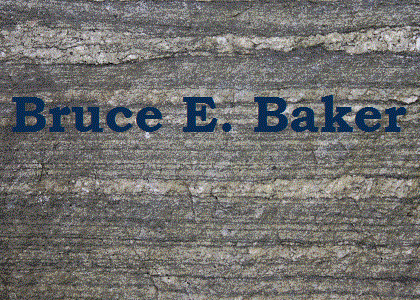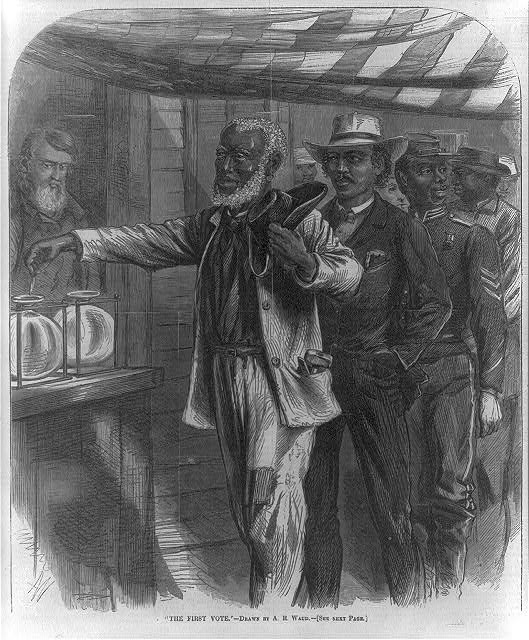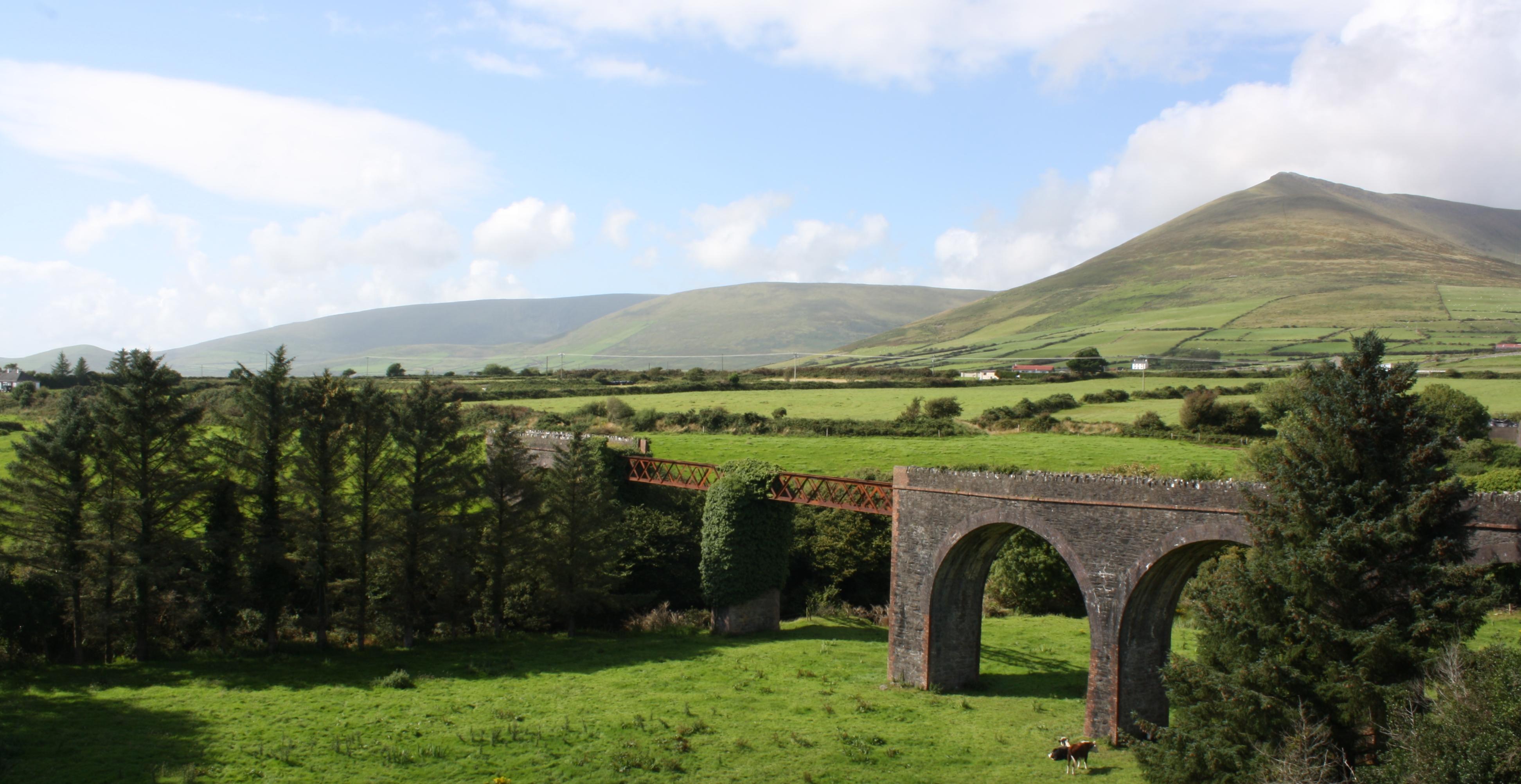 |
|
|
A very brief summary: The Civil War in the United States was fought over the issue of whether slavery would continue or not. The Confederate States of America, aka the South, lost the war, and so slavery ended. The term "Reconstruction" refers to the period of about twelve years right after the war when the former Confederates were politically weakened by losing the war and the victorious Union (aka the North) was able to insist that African Americans in the eleven former Confederate states (the vast majority of whom had until recently been enslaved) had political rights. Most white people in the South were very opposed to this and resisted in many ways, mostly violent. Eventually, most of the white people in the North got tired of fighting with the white southerners over this and gave up on insisting that African Americans be allowed to participate in politics. |
 |
Library workshop:
Students in the Thursday, 2-4pm seminar will have their library workshop on Thursday, 3 November, at the LOCATION TBA Cluster in Robinson Library. Students in the Thursday, 4-6pm seminar will have their workshop on Thursday, 3 November, at the LOCATION TBA Cluster in Robinson Library.
Week 2
Before we can understand the historiography of Reconstruction, we need to know a bit about what it is. To start with, read the Wikipedia article that summarises the Reconstruction Era: http://en.wikipedia.org/wiki/Reconstruction_Era. Obviously, this is not a scholarly, peer-reviewed source, so don't cite it in your essays, but it gives a decent initial overview of what is quite a complex historical topic. Keep in mind that since Wikipedia is continually updated, this is more or less a 2016 view of the topic though not peer-reviewed and therefore unsuitable as a source for your scholarly work. If you are feeling ambitious, you might also want to glance through either Eric Foner's Reconstruction: America's Unfinished Revolution or Michael Fitzgerald's A Splendid Failure. Please also read John David Smith's introduction to John David Smith and J. Vincent Lowery, eds., The Dunning School: Historians, Race, and the Meaning of Reconstruction (Lexington: University Press of Kentucky, 2013), 1-47. We will also discuss Chapter 1 of Fish, How To Write a Sentence. The class will mostly be a mixture of discussion and answering your questions about the topic before we begin reading the other material in subsequent weeks.
Week 3
In class during Week 2, you will each be assigned one of the chapters out of John David Smith and J. Vincent Lowery, eds., The Dunning School: Historians, Race, and the Meaning of Reconstruction (Lexington: University Press of Kentucky, 2013). Be sure to have read it before class and arrive prepared to discuss it. Also read Chapter 2 of Fish, How To Write a Sentence.
For next week, write a brief (300-400 words) summary of the book chapter you read for this week. Consider questions such as these (or others that seem relevant):
- What is the author's main thesis?
- What are the key arguments in support of the thesis?
- What ideas does the author seem to be arguing against?
- Are there specific historians the author agrees or disagrees with?
- What kinds of sources does the author use?
- Are there parts of arguments that are not supported by the evidence provided?
- What assumptions does the author hold about the topic?
Week 4
Book reviews are an important part of the scholarly discussion, especially in history since the extended monograph is the primary form of scholarly work. Find a contemporary book review of one of the books about Reconstruction by the historian you read about in the Smith and Lowery collection, read it, and bring a copy to class to discuss.
We will begin to discuss how African American historians (part of the "Negro History" movement) in the 1920s and later criticized the Dunning School. For this class, please read the following items:
- Bruce E. Baker, What Reconstruction Meant: Historical Memory in the American South (Charlottesville: University of Virginia Press, 2007), 113-117.
- John R. Lynch, "Some Historical Errors of James Ford Rhodes," Journal of Negro History 2:4 (Oct. 1917): 345-368.
Also, read Fish, How To Write a Sentence, Chapter 3.
Week 5
Library Workshops will be held at the Hope Computer Cluster in Robinson Library this week during the regular seminar time.
Week 6
Because the historical profession was segregated, white historians at mainstream universities were not paying much attention to Negro historians until the 1930s. A handful of white historians began to change things in the 1930s, and by the late 1940s, the Dunning School was on its last legs. For this week, you should all read the following articles:
- Bruce E. Baker, What Reconstruction Meant: Historical Memory in the American South (Charlottesville: University of Virginia Press, 2007), 117-122.
- Francis B. Simkins, "New Viewpoints of Southern Reconstruction"
- Howard K. Beale, "On Rewriting Reconstruction History"
- John Hope Franklin, "Whither Reconstruction Historiography?"
Also, read Fish, How To Write a Sentence, Chapter 4.
Week 7
Once the Dunning School's influence began to fade, it opened up the field for three decades of revisionist scholarship that, as Du Bois had suggested in 1935, would "tell this story as though Negroes were ordinary human beings." This revolutionized views of Reconstruction. Find a journal article from 1950-1980 that exemplifies this new approach. Read it and bring it to class with you. Also, find two book reviews of one monograph from this period by a different historian. Read them and bring them to class with you.
Also, read Fish, How To Write a Sentence, Chapter 5.
The first essay is due on Wednesday of this week. The essay should compare the following two articles about the Ku Klux Klan in South Carolina:
- John S. Reynolds, Reconstruction in South Carolina (Columbia: The State Co. Publishers, 1905), Ch. V, pp.179-217, available online here.
- Francis B. Simkins, "The Ku Klux Klan in South Carolina, 1868-1871," Journal of Negro History 12:4 (Oct. 1927): 606-647.
Week 8
To get a sense of the cumulative effect of revisionism, read Eric Foner's historiographical article "Reconstruction Revisited" and John Hope Franklin's "Mirror for Americans: A Century of Reconstruction History."
Also, read Fish, How To Write a Sentence, Chapter 6.
Week 9
For the past couple of weeks, we have been reading about revisionist accounts of Reconstruction. There was a school of thought that followed this called "postrevisionism." Figure out what that means and come to class prepared to discuss an example of postrevisionist scholarship you have located and read.
Also, read Fish, How To Write a Sentence, Chapter 7.
Week 10
What has been happening in Rconstruction history in the quarter century since Eric Foner's book Reconstruction: America's Unfinished Revolution, 1863-1877? Read Michael Perman's review of Foner's book, "Eric Foner's Reconstruction: A Finished Revolution?". Also, find at least one edited collection of essays since 1990 that considers new approaches to the study of Reconstruction.
By this point in the class, you should have read closely at least eight items. You should read another two items to bring your total up to ten, plus one unconventional source (i.e., not a scholarly monograph or scholarly journal article), and prepare an annotated bibliography. This will be a bibliography following the standard style, with a brief (3-4 sentences) paragraph below each item explaining its main ideas and significance. These materials will provide the basis for your essay. You should come prepared to present your unconventional source to the other members of the tutorial and discuss it.
Week 11
This week we will focus on argument by comparing two versions of the same argument by the same historian, made several years apart and based on different evidence. For this seminar, please read the following two articles by Michael Fitzgerald about the Ku Klux Klan in Alabama and come to class prepared to discuss why Fitzgerald's arguments changed over time.
- Michael W. Fitzgerald, "The Ku Klux Klan: Property Crime and the Plantation System in Reconstruction Alabama" Agricultural History 71:2 (Spring 1997): 186-206.
- Michael W. Fitzgerald, "Ex-Slaveholders and the Ku Klux Klan: Exploring the Motivations of Terrorist Violence," in Bruce E. Baker and Brian Kelly, eds., After Slavery: Race, Labor, and Citizenship in the Reconstruction South (Gainesville: University Press of Florida, 2013), 143-158. (e-book)
Week 12
Conclusion -- The second essay is due on Wednesday, 18 January 2017. The essay should address this question: Using examples from Reconstruction (and other topics if possible), explain how racial segregation affected the writing of history in the twentieth century. The seminars will not meet on Thursday as usual, and instead I will be available to discuss your essays on Thursday, 12 January 2017, from 2-4pm, location TBA.
